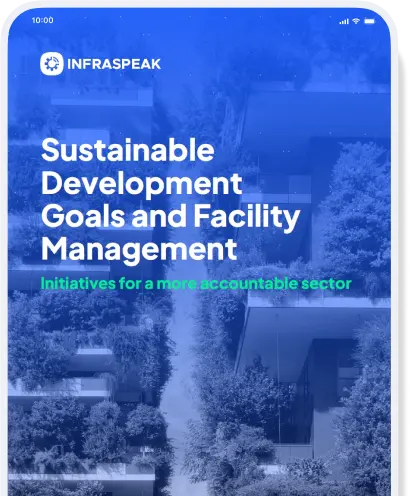What is integrated facilities management?
Integrated Facilities Management (IFM) is a comprehensive approach that consolidates many aspects of facility operations into one platform. It combines maintenance, security, cleaning, project management, and workspace management into a single system.
IFM creates a unified system to organise and coordinate all facility services — whether being handled by internal or external teams. Its aim is to ensure seamless operations across all functional parts of the business.
How does it work?
At its core, IFM coordinates. Imagine you have several departments handling different tasks within your facility. Instead of each team working separately, IFM brings them together on one platform.
Here is what it means: If there’s an issue — say, a leaky roof — the system will alert the facilities team. Then, they can fix it quickly without waiting for one vendor to pass the issue on to another. Likewise, when everyone is on the same page, security will remain tight, cleaning will be done at the right time, and every department will stay informed.
📈 It’s no surprise that the global IFM market is booming. It has increased from US$87.86 billion in 2021 to US$94.18 billion in 2022-2023 and will reach US$119.55 billion in 2026.
Key components of integrated FM
Integrated Facilities Management covers all the areas needed to keep a facility running. Below are the main components of IFM:
- Maintenance management: It focuses on scheduling, repairs, and preventive maintenance measures to keep equipment running.
- Space management: It optimises the allocation and utilisation of physical space.
- Supplier relationship management: It coordinates and supervises external service providers and contracts.
- Financial management: It manages budgeting, cost control, and financial reporting.
- Risk & compliance management: It ensures obedience to safety regulations and minimises potential risks.
- Sustainability & energy management: It implements eco-friendly practices to enhance energy usage.
- Technology integration: It uses software and digital tools to streamline facilities management processes.
📝You should also read: 10 best facilities management software in 2025
Benefits of integrated facilities management
1. Increased efficiency and productivity
Traditional facilities management is too chaotic, especially when many services are individually managed. This results in confusion, delays, and extra paperwork.
However, Integrated Facilities Management (IFM) reduces bottlenecks and misunderstandings. It does this by automating operations, centralising communication, and giving real-time information. Businesses can operate under a unified system tailored to their needs.
2. Stronger focus on sustainability
Sustainability is no longer a buzzword — it’s a major component of modern facilities management.
Think about utilities — electricity, water, heating — they’re essential, but also one of the biggest expenses for any organisation. Many don’t even realise how much they spend because they don’t have a clear picture of their consumption. Sure, your utility provider gives some data, but it’s scattered, and manually tracking it across different systems is a nightmare.
Sustainable facilities management solutions consolidate utility data and provide insights into your spending on utility. They align facility operations with global sustainability goals, like the United Nations’ Sustainable Development Goals (SDGs), which promote environmental conservation.

3. Cost savings through efficient resource allocation
The worldwide economic effect of COVID-19 has left many business owners seeking methods to manage and decrease expenses.
Many invest in multiple software and hardware solutions, thinking they’re optimising operations. But the reality is those subscription fees, maintenance costs, and overlapping tools drain your budget without value.
For example, facilities managers spend an average of 30–33% of their budget on unplanned repairs. IFM’s clear and structured approach will identify inefficiencies and reduce excessive spending. It ensures that businesses operate smarter — not just cheaper.
4. Flexibility and adaptive management
Businesses are growing, restructuring, and adjusting to new demands. If your facilities management system isn’t flexible, it will slow you down.
A scalable FM solution helps businesses adjust facility services as needed. As such, you can adapt easily if you’re expanding, downsizing, or making operational changes. This would make everything run without hiccups, no matter what changes come your way.
You may also like: What is total facilities management? A comprehensive guide
5. Rich data analytics for informed decisions
Managing facilities is easier when you have the right data at your fingertips. Modern building management systems track asset performance, maintenance needs, and energy consumption. They make facilities managers make informed decisions rather than relying on guesswork.
With real-time insights, businesses can predict maintenance issues before they cause disruptions.
In addition, they can increase the lifespan of assets and reduce unnecessary costs. A data-driven approach ensures smoother operations, better planning, and more efficient facilities management overall.
6. Enhanced communication and collaboration
Integrated facilities management platforms are designed to help everyone work together more smoothly. They include built-in tools that let facilities managers, service providers, and technicians communicate quickly and easily.
Using Infraspeak Network™, for example, allows you to establish direct communication channels with suppliers and accelerate the onboarding of new partners, by ensuring they immediately adhere to your facilities’ protocols. This integrated approach minimises administrative work through unified workflow management, and here’s what it does:
- Creates direct communication channels among facility managers, service providers, and technicians
- Streamlines interactions with suppliers
- Accelerates onboarding of new partners by aligning them with your facility’s protocols
- Minimises errors and reduces administrative workload through unified workflow management
- Centralises work order management
- Automates routine maintenance tasks
- Provides real-time updates
- Offers robust reporting and analytics for proactive decision-making
- Maintains a transparent audit trail of all activities
- Integrates budget oversight with expense tracking
- Enhances day-to-day responsiveness and accountability
- Drives cost savings and supports strategic planning
- Elevates the overall quality of service
Is there any disadvantage of integrated facility management?
Some facility managers worry about losing direct control, relying on a single provider, or facing transition challenges. These concerns are valid. However, they’re no big deal with the right IFM partner.
A well-structured IFM approach ensures transparency and reduces errors and duplicates that come with managing multiple vendors. Instead of downsides, IFM provides a centralised, proactive, and technology-driven solution that helps businesses scale.
While some facilities management software offer full packages, it’s best to choose the tools that match your firm’s needs. You can use one FM provider or even combine different solutions. Also, a careful review will help ensure that the IFM tools you select effectively support your business goals.
So, is IFM the right move for your organisation? Absolutely — when done right!
Still in doubt? Here’s an article that shows you how to face the dark side of facilities management
Success case: Rohloff Group
The Rohloff Group is the South African master franchise for KFC, overseeing hundreds of restaurants spread across the Western Cape, Gauteng, and the Free State.
Managing a network of this magnitude requires an agile system capable of handling various operational challenges and asset management tasks.
Historically, the group relied on a legacy system that couldn’t meet the comprehensive needs of KFC operations. This older system struggled with managing assets. Aside from that, it lacked advanced features, such as work order management, task automation, supplier and budget oversight, software integration, and data analysis. It led to delays, miscommunications, and difficulties in maintaining consistent service quality.
In search of a better solution, the Rohloff Group transitioned to Infraspeak, which turned things around. Infraspeak Network™ improved communication, coordination, and transparency in all operations.
The benefits of this transition were evident almost immediately. In the first year, the group managed 18,000 requests for quotes and work orders through the system and collaborated with over 60 different vendors. All thanks to the platform’s ability to automate routine tasks, centralise data, and enable internal teams and external service providers to “Work as One.”
A key factor in their success was the early adoption of the approval flow feature. This functionality provided the group with enhanced control over budget approvals, ensuring that every expense was meticulously tracked and justified. Then, financial oversight increased, allowing them to minimise unnecessary spending and optimise resource allocation.
Future-proofing your facilities management practices
The demand for Integral FM is increasing as businesses see the need for sustainability and cost-effectiveness. It’s a forward-thinking strategy that combines maintenance, security, cleaning, and more into one streamlined system.
By centralising all operations on a single platform, IFM ensures greater efficiency, reduces costs, and provides real-time insights for smarter decision-making. Take the Rohloff Group, for instance. Their adoption of the Infraspeak Network™ shows how a robust IFM solution can future-proof your facility management.
Ready to future-proof your operations? Book a free call with us now!


